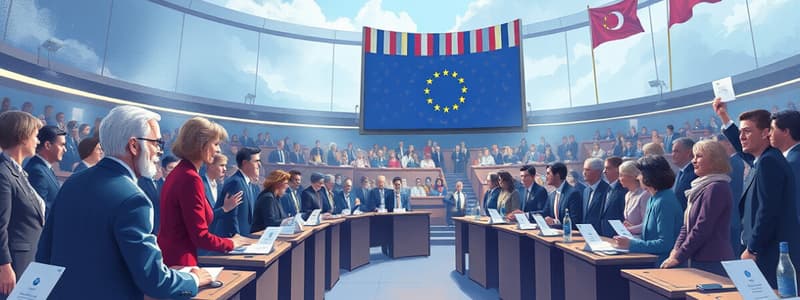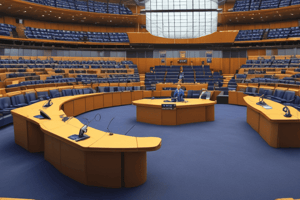Podcast
Questions and Answers
What is the primary focus of plenary sessions in the European Parliament?
What is the primary focus of plenary sessions in the European Parliament?
- Debating and voting on new laws (correct)
- Negotiating with national governments
- Conducting committee meetings
- Drafting legislative proposals
Which legislative procedure allows the European Parliament to amend proposals?
Which legislative procedure allows the European Parliament to amend proposals?
- Budgetary procedure
- Ordinary legislative procedure (correct)
- Consent procedure
- Consultation procedure
During which month does the European Parliament usually not hold plenary sessions?
During which month does the European Parliament usually not hold plenary sessions?
- July
- August (correct)
- September
- June
What is the role of the European Parliament in the consent procedure?
What is the role of the European Parliament in the consent procedure?
Which treaty introduced the codecision procedure?
Which treaty introduced the codecision procedure?
What can the European Parliament do during 'Question Time' with the Commission?
What can the European Parliament do during 'Question Time' with the Commission?
Which type of report holds more legislative weight within the European Parliament?
Which type of report holds more legislative weight within the European Parliament?
How many seats are there in the European Parliament?
How many seats are there in the European Parliament?
What is the term length for the President of the European Parliament?
What is the term length for the President of the European Parliament?
What is required to form a political group in the European Parliament?
What is required to form a political group in the European Parliament?
Which of the following political groups is NOT currently represented in the European Parliament?
Which of the following political groups is NOT currently represented in the European Parliament?
What role does the President of the European Parliament NOT perform?
What role does the President of the European Parliament NOT perform?
How many permanent committees does the European Parliament have?
How many permanent committees does the European Parliament have?
Which group is known for having a progressive stance within the European Parliament?
Which group is known for having a progressive stance within the European Parliament?
What advantage do political groups in the European Parliament enjoy?
What advantage do political groups in the European Parliament enjoy?
Flashcards are hidden until you start studying
Study Notes
European Parliament Structure and Elections
- Comprises 720 seats, elected every five years through direct elections.
- Current parliamentary term commenced in June 2024.
Presidency of the European Parliament
- The President is elected by Members of the European Parliament (MEPs) for a renewable term of two and a half years.
- Represents Parliament externally and in inter-institutional relations, chairs plenary sessions, and ensures adherence to Rules of Procedure.
- Signs the EU budget post-adoption and legislative acts passed under the ordinary legislative procedure.
Political Groups
- MEPs are organized into eight political groups based on affiliation, not nationality.
- Forming a political group requires a minimum of 23 MEPs from at least one quarter of member states (currently 7).
- Non-attached MEPs are those not affiliated with any political group.
- Political groups manage internal organization, appoint chairs, and influence parliamentary committees and delegations.
Major Political Groups
- Left: Progressive Alliance of Socialists and Democrats (S&D)
- Greens/EFA: The Greens / European Free Alliance
- Liberal: Renew Europe
- Center-right: European People’s Party (EPP)
- Right: European Conservatives and Reformists (ECR)
- Nationalist: Patriots for Europe
- Sovereignist: Europe of Sovereign Nations (ESN)
Legislative Process
- Operates in 20 permanent committees, with all MEPs contributing.
- Proposals for new EU laws are introduced by the European Commission, discussed in committees, and voted on.
- Whole Parliament votes during plenary sessions.
Plenary Sessions
- Occurs monthly in Strasbourg, excluding August, lasting four days.
- Focuses on debates and voting on legislative reports, budgetary procedures, and non-legislative reports.
- Only texts adopted in plenary constitute formal acts of the European Parliament.
Types of Parliamentary Texts
- Legislative reports: Examined under various procedures, with ordinary legislative procedure granting equal legislative power to Parliament with the Council.
- Budgetary authority: European Parliament and Council jointly determine EU expenditure and revenue annually.
- Non-legislative reports: Issued on initiatives within parliamentary committees, aiming to influence other institutions.
Question Time
- Allocated for MEPs to question the Council and Commission, held weekly.
- Questions must be submitted in advance for admissibility by the President of the European Parliament.
Legislative Procedures
- Ordinary Legislative Procedure (Co-decision): Equal power between Parliament and Council to amend, approve, or reject legislation; constitutes most EU law enactment.
- Consent Procedure: Parliament can approve or reject proposals without amendments, used for significant EU decisions like international agreements.
- Consultation Procedure: Advisory role for Parliament on proposals, with final decisions resting solely with the Council, applicable in specific areas like taxation and competition law.
History of Legislative Procedures
- Ordinary Legislative Procedure: Established by the Maastricht Treaty (1992), enhanced by the Amsterdam Treaty (1999), and solidified as the main legislative process by the Lisbon Treaty (2009).
- Consultation and Consent Procedures: Used for specific legislative processes; while consultation is advisory, consent allows Parliament to block proposals but not amend them, enhancing its role in democratic oversight.
Studying That Suits You
Use AI to generate personalized quizzes and flashcards to suit your learning preferences.




